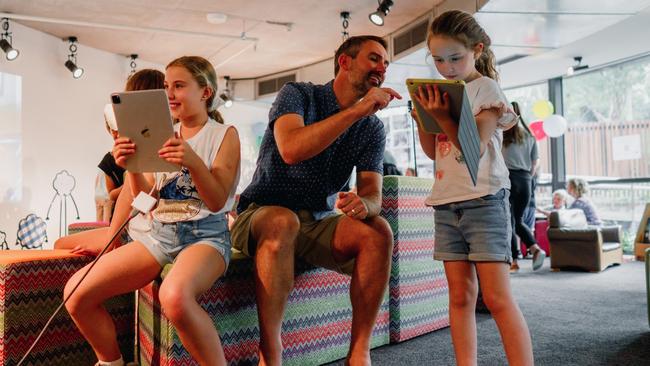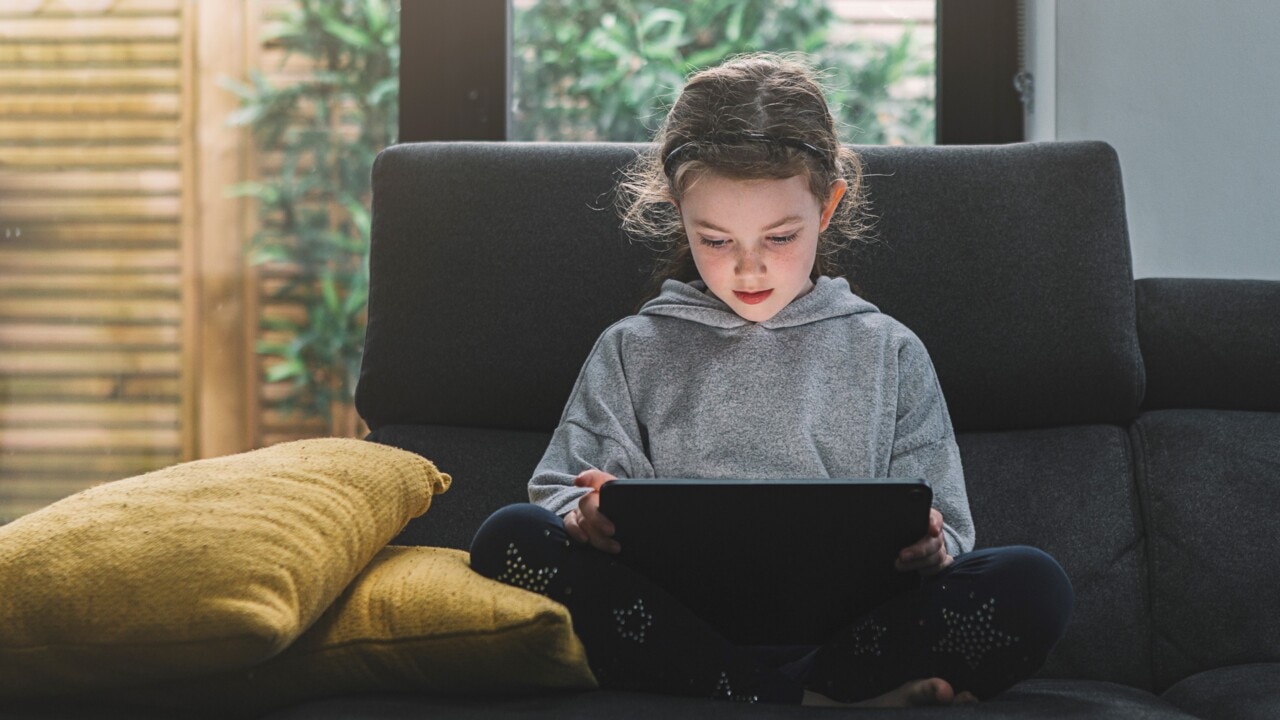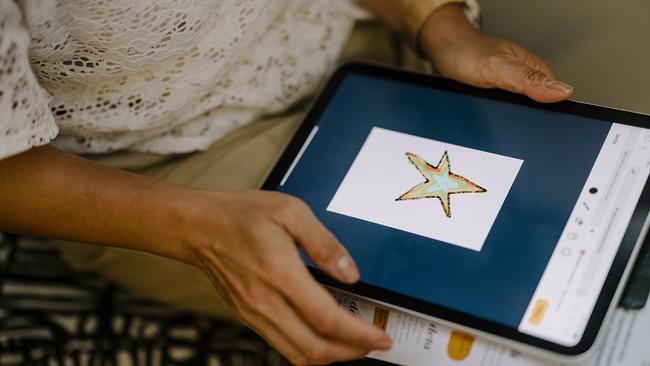Managing kids’ screen time ... without tears
Even if it’s simply running in the background in a room, TV can be damaging for children.

It’s perhaps the greatest challenge of modern parenting: how to manage the constant presence of screens in our children’s lives.
It’s not only smartphones; screens are ubiquitous in almost every aspect of our modern lives, and even the television running in the background in the loungeroom could be affecting your child’s development.
The pronouncements of the dangers of screens are becoming strident and at times scary: prominent American social psychologist Jonathan Haidt declares in his recent seminal book on the topic that smartphones have ushered in “the rewiring of childhood”, declaring that allowing children to grow up on smartphones has been “the biggest blunder we have ever made” that has profound consequences not only for brain development but for democracy itself.
Haidt’s manifesto, contained in his book The Anxious Generation: How the Great Rewiring of Childhood is Causing an Epidemic of Mental Illness, cites a Pew Research Centre study that found by 2022 almost half of teens were online “almost constantly”, some up to 16 hours a day. He linked the trend with rising rates of mental ill-health and suicide and devastating impacts on the self-image and self-esteem particularly of girls engaging with social media.
Tech giants including Meta and Apple stand accused of calculatedly devising algorithms that hook teens to screens and keep them addicted through constant dopamine hits that change the brain chemistry itself.

But, in reality, by the time a 13-year-old gets their first smartphone – if a parent has managed to hold out that long – they’ve already had an entire childhood marked by screen time.
Virtually every school in the country now institutes a bring-your-own-device policy where children learn on laptops and iPads from year 3 onwards. Many parents rely on iPads for sorely needed moments of distraction with their infant children and many are guilty of scrolling on their own phone during caregiving hours or at the family dinner table.
What’s less well known in the screen time debate is that a parent’s own screen use may have important impacts on their child’s development. And there are other lesser known evils, according to researchers from the University of Wollongong: even having the TV running in the background in the living room can influence a child’s language development and cognition.
“Screen time is a really hotly debated issue for parents and for educators,” says Dylan Cliff, an associate professor with the Australian Research Council Centre of Excellence for the Digital Child at the University of Wollongong.
“What we see internationally is different forms of guidance.

“In Australia, it’s recommended that preschoolers have not more than one hour a day of screen time, whereas in other countries like the UK they’ve moved away from limits and they’re focusing more on the context and guidance that could help parents and other caregivers.”
That’s in line with a growing body of research that indicates it’s not only the quantity of screen time that is the important factor, it’s also the quality, and involvement and interactions of a parent when children are using screens.
Cliff and his colleague Sumudu Mallawaarachchi have conducted a meta-review published in the American journal JAMA Pediatrics of studies on “screen context”, analysing 100 papers on the influence of screen use contexts on cognitive, social and emotional development among children aged from birth to five years.
“One of the key takeaways was that when children spent more time co-using screens with caregivers, it resulted in better cognitive outcomes, particularly language outcomes for children,” Cliff says.
The UOW findings add to recent research out of France, building on a decade of studies in the area, that has found context is key in toddler screen time. Context includes the behaviour of adult caregivers during viewing, the age-appropriateness of the viewing, the interactivity of the screen and whether the screen is in the background. Depending on the context, screen viewing can have positive, neutral or negative effects on infants’ cognition.
Key to whether screens are beneficial for young children is the way the infant is able to make use of the information presented to them and how they learn from videos. It’s well-established that children learn more effectively from interacting in real life rather than on a screen because of a phenomenon in the young brain known as the “video-deficit effect”.
This has been dubbed a “perceptual impoverishment hypothesis” that posits that children have poorer brain stimulation and perception on screens when compared with the real world because of a cognitive process known as stereoscopic vision, which is the way two separate images captured by the eye are combined in the brain.
Stereoscopic vision develops around five months of age but it remains poor throughout childhood. The ability to perceive depth in two-dimensional images develops only from the age of seven months and is not mature until after the age of two.
“Standard screens do not contain stereoscopic information and screens also differ from reality in other aspects: their luminance is lower, they cover a smaller field of view and some of them cannot be interacted with,” says a 2022 paper published in the journal Frontiers in Psychology by researchers at the University of Toulouse-Jean Jaures. “These perceptual differences may interfere with infants’ ability to learn from videos or to generalise from the screen to the real world. By six months of age, infants can reproduce new actions directed at objects shown on a screen, actions that they would otherwise not produce spontaneously, after simply manipulating the objects.
“However, by 12 months, it takes twice as many demonstrations and exposure time for infants to imitate actions from a 2D model on screen than from a real 3D model. Thus, whilst young infants may be able to reproduce actions they saw on a screen, overall they do not seem to view video as relevant to real life.”
Generally, there is good reason to be concerned about screens being used as a nanny or a distraction for young children without parental input. Evidence suggests screen exposure at four months of age was related to worse inhibitory control 10 months later, and screen exposure at 24 months was negatively associated with the development of executive functions from 24 to 36 months
However, although young children have difficulty perceiving and processing information from screens, narration by a parent of the action on a screen is likelier to lead to imitation, which is key to learning. Therefore when parents name objects on the screen or comment on them, screen time turns from resulting in negligible learning to being beneficial.
One irony about the growing concern over screen time is the evidence suggests a much older technology – TV – may be more harmful to children’s development. The number of hours of TV watched daily at ages one and three strongly predicts measures of hyperactivity at age seven, research has found.
TV is a much more passive medium than screens, is not conducive to learning and has been associated with poorer language development, even if it’s simply running in the background in a room. This is largely because TV interrupts the quality and quantity of parent-child interactions and at the same time distracts children from play and their ongoing activities. Parents also tend to use less vocabulary with their children when a TV is running.
Parents’ own use of screens can be similarly detrimental to the parent-child relationship that is so important for learning.
“One of our more novel findings was that when parents were able to avoid using screens during things like family meals or just those times when they connect with their child, the child had better social skills and ability to regulate emotions,” Cliff says.
“It’s the quality of the interaction that is important. When a child is receiving a parent’s undivided attention, that is so important for bonding, and what is shows from the parent is that the child is really important to them.
“And that’s one of the main things that children want to know – that they’re valued and really appreciated by their parent. And that’s really important, particularly for behavioural outcomes.”
The takeaways from the UOW research are relatively simple and easy to implement. They include making screen time a shared activity between parent and a young child, ensuring screen content is age-appropriate, ensuring that parents do not let screens get in the way of interactions with their child, and turning off the TV whenever possible.
This guidance is likely to be far more important than attempting to wage an unrealistic and losing battle for a zero-screen existence.
Top tips for managing kids’ screen time
●Make screen time with young children a shared activity and comment on the content
●Ensure content is age-appropriate
●Do not scroll on your phone when in the company of your child
●Turn off the television whenever possible






To join the conversation, please log in. Don't have an account? Register
Join the conversation, you are commenting as Logout